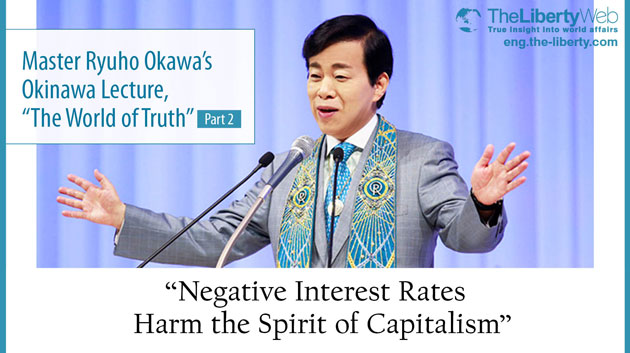“Negative Interest Rates Harm the Spirit of Capitalism”
Master Ryuho Okawa's Okinawa Lecture "The World of Truth" Part 2
Recently, the Bank of Japan introduced negative interest rates, becoming the nation’s first monetary policy.
Master Ryuho Okawa, founder of Happy Science, commented on this in his lecture “The World of Truth” at the Okinawa Convention Center last month.
The Bank of Japan Intends to Pump Funds into the Market
Usually, people who borrow money have to pay interest, but this negative interest rate system works the other way. This means that when people deposit money into the banks, they have to pay money, which makes it much less attractive to leave money with the banks, prompting people to spend it.
Currently, private banks have deposited large sums of money in the Bank of Japan to earn interest. Through introducing the negative interest rate policy, the Bank of Japan is trying to pump money into the market.
The first of Abenomics “three arrows” was partly intended to expand financial policies.
This Is Harming the Spirit of Capitalism
While showing understanding of the Bank of Japan’s situation, Master Okawa commented, “They are trying to create a kind of economic bubble to dazzle everyone,” and “This can work as a short-term election campaign, but on the long-run it will end up harming the economic progress of Japan.”
Even if money did flow into the market, if there were no suitable borrowers, private banks would end up having to buy government bonds or enterprise stocks. If this were to happen, it would momentarily become easier to absorb government bonds and stocks would look as if they were rising. Economic indicators would show growth, and it would seem as if economic conditions were improving.
Master Okawa, however, warned, “Seen from the view of economic science, this idea is mistaken. Negative interest rates harm the spirit of capitalism.” The spirit of capitalism is that the accumulation of small efforts brings great success as Japanese economist and philosopher, Sontoku Ninomiya, taught. That is, economic scale should grow through the accumulation of small capital. The negative interest rates policy is the exact opposite, as people who save will make losses.
Master Okawa warned that if people are unable to accumulate capital, no one will be able to expand a business to make greater profit, and therefore the economy will never grow.
So, even if it were only temporary, we shouldn’t take measures that ignore the principles of a free economy. The rise in the consumption tax rate to 8% was a mistake in the first place. If Abenomics had not increased taxes and had stuck to its original plan, there would have been no need to introduce negative interest rates.
Create an Environment Where People Want to Borrow Money to Use
What we should do now is to create an environment where people want to use money, even if they have to borrow it. More specifically, it means the cultivation of key industries such as early improvements on linear motorcar, aviation, and space industries. In addition, a thorough deregulation will set economic activities in motion. The need for tax rate reduction is without question, which will make the future brighter.
Abenomics took ideas from the Happiness Realization Party (HRP), which has long been indicating an economic policy for the future.
The HRP economic policy is to setup a free environment to draw out the potential of the citizens, and to aim for economic growth in this way.
The Abe administration thinks that governmental economic policies can control economic conditions, but this approach will only make the Japanese economy plunge headfirst into darkness.
We must hope that they do not use this negative interest rate policy to up the economic indicators as an excuse to raise the tax rate even further.



















